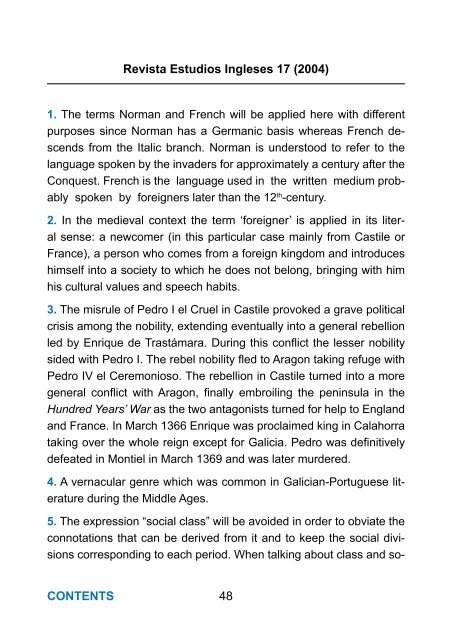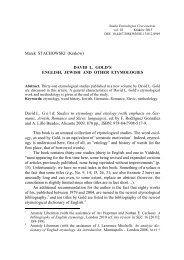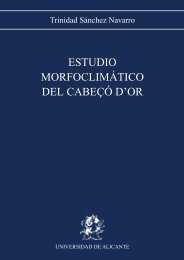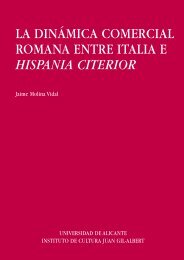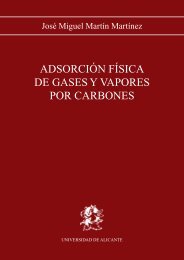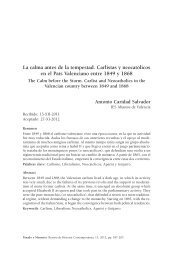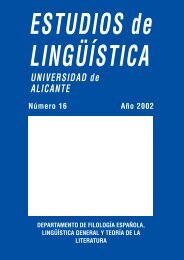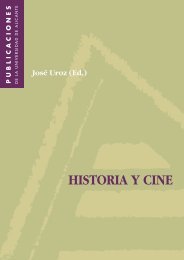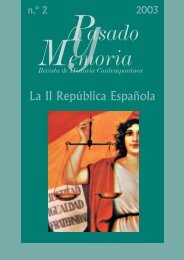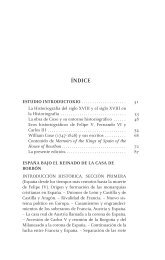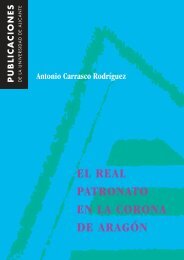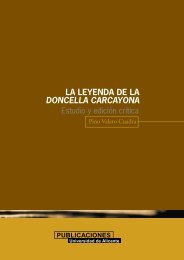English and Galician in the Middle Ages - Publicaciones ...
English and Galician in the Middle Ages - Publicaciones ...
English and Galician in the Middle Ages - Publicaciones ...
You also want an ePaper? Increase the reach of your titles
YUMPU automatically turns print PDFs into web optimized ePapers that Google loves.
Revista Estudios Ingleses 17 (2004)<br />
1. The terms Norman <strong>and</strong> French will be applied here with different<br />
purposes s<strong>in</strong>ce Norman has a Germanic basis whereas French descends<br />
from <strong>the</strong> Italic branch. Norman is understood to refer to <strong>the</strong><br />
language spoken by <strong>the</strong> <strong>in</strong>vaders for approximately a century after <strong>the</strong><br />
Conquest. French is <strong>the</strong> language used <strong>in</strong> <strong>the</strong> written medium probably<br />
spoken by foreigners later than <strong>the</strong> 12 th -century.<br />
2. In <strong>the</strong> medieval context <strong>the</strong> term ‘foreigner’ is applied <strong>in</strong> its literal<br />
sense: a newcomer (<strong>in</strong> this particular case ma<strong>in</strong>ly from Castile or<br />
France), a person who comes from a foreign k<strong>in</strong>gdom <strong>and</strong> <strong>in</strong>troduces<br />
himself <strong>in</strong>to a society to which he does not belong, br<strong>in</strong>g<strong>in</strong>g with him<br />
his cultural values <strong>and</strong> speech habits.<br />
3. The misrule of Pedro I el Cruel <strong>in</strong> Castile provoked a grave political<br />
crisis among <strong>the</strong> nobility, extend<strong>in</strong>g eventually <strong>in</strong>to a general rebellion<br />
led by Enrique de Trastámara. Dur<strong>in</strong>g this confl ict <strong>the</strong> lesser nobility<br />
sided with Pedro I. The rebel nobility fl ed to Aragon tak<strong>in</strong>g refuge with<br />
Pedro IV el Ceremonioso. The rebellion <strong>in</strong> Castile turned <strong>in</strong>to a more<br />
general confl ict with Aragon, fi nally embroil<strong>in</strong>g <strong>the</strong> pen<strong>in</strong>sula <strong>in</strong> <strong>the</strong><br />
Hundred Years’ War as <strong>the</strong> two antagonists turned for help to Engl<strong>and</strong><br />
<strong>and</strong> France. In March 1366 Enrique was proclaimed k<strong>in</strong>g <strong>in</strong> Calahorra<br />
tak<strong>in</strong>g over <strong>the</strong> whole reign except for Galicia. Pedro was defi nitively<br />
defeated <strong>in</strong> Montiel <strong>in</strong> March 1369 <strong>and</strong> was later murdered.<br />
4. A vernacular genre which was common <strong>in</strong> <strong>Galician</strong>-Portuguese literature<br />
dur<strong>in</strong>g <strong>the</strong> <strong>Middle</strong> <strong>Ages</strong>.<br />
5. The expression “social class” will be avoided <strong>in</strong> order to obviate <strong>the</strong><br />
connotations that can be derived from it <strong>and</strong> to keep <strong>the</strong> social divisions<br />
correspond<strong>in</strong>g to each period. When talk<strong>in</strong>g about class <strong>and</strong> so-<br />
CONTENTS<br />
48


